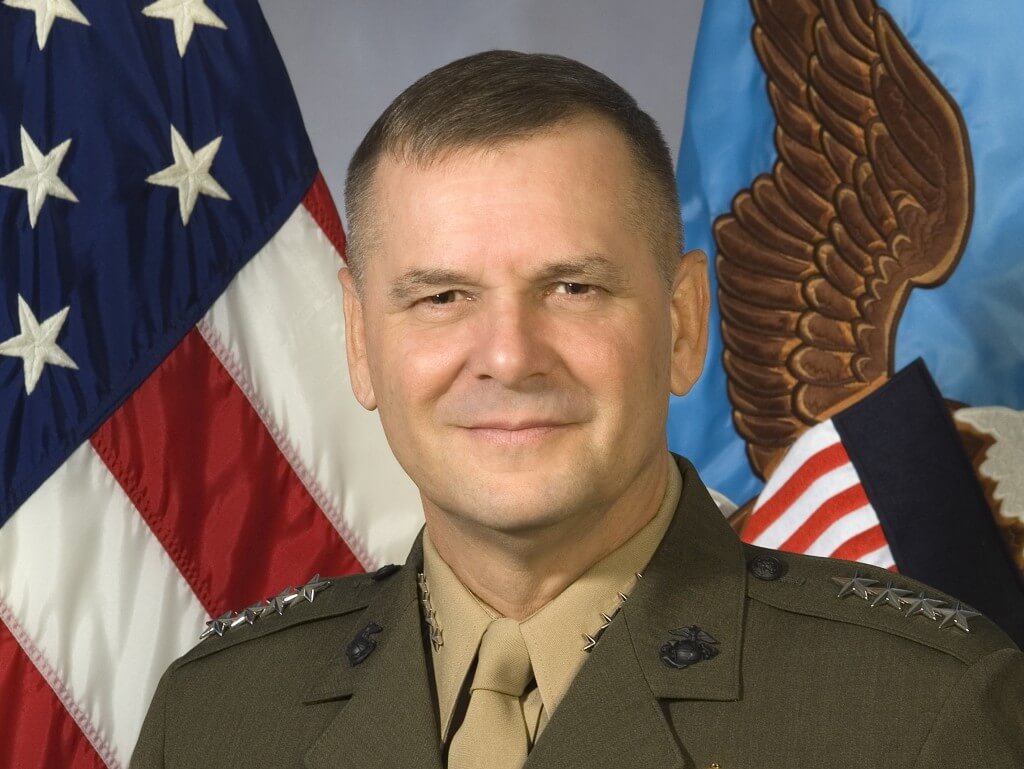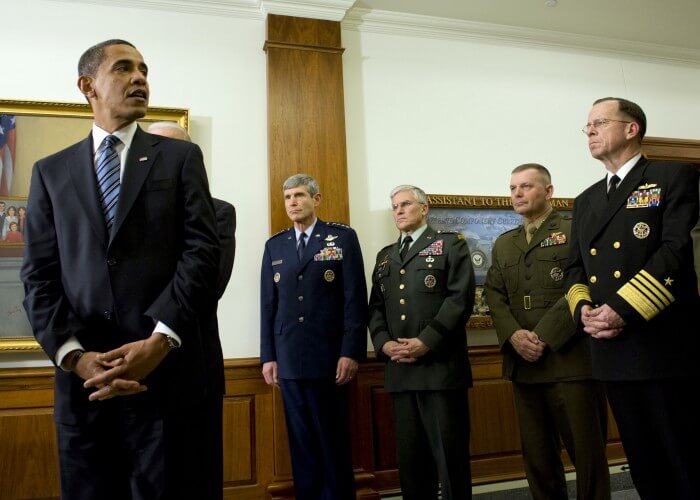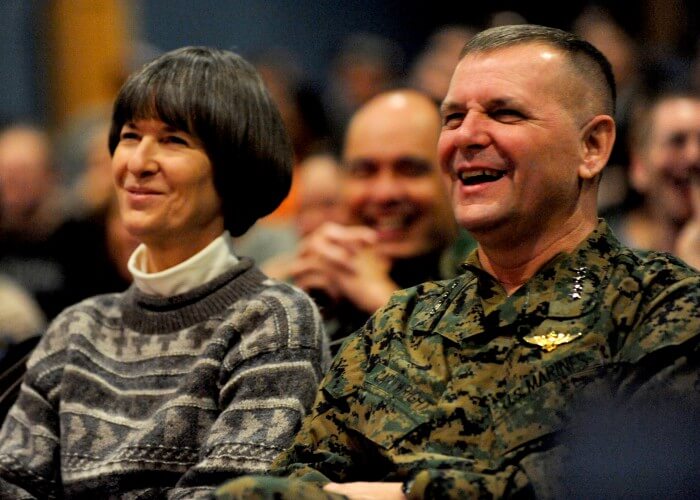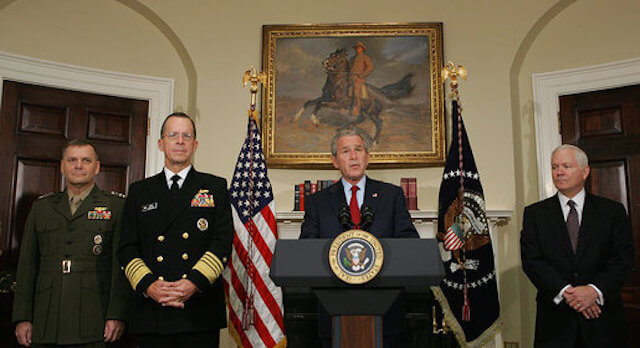How College Swimming Changed 4-Star General James Cartwright’s Life

By Annie Grevers, Swimming World Staff Writer
Four-star General James Cartwright was not supposed to go to college. His grandparents had a farm in Rockford, Illinois, which Cartwright began working on as a kid. He would live on and tend to the farm over the summers until he was 13. His grandfather passed, and the farm was leased, opening a door for young Cartwright to give sports a whirl.
“Dad liked baseball and swimming, and I gravitated more toward swimming,” Cartwright recalled. Conveniently, swimming liked Cartwright too. The 9th grader went undefeated in the city and consistently placed in the top four at the Illinois State Championship meet.
An anomaly in today’s world, Cartwright was a swimmer and a diver.
“Swim teams were typically small, so we almost always had some gaps to fill in other events,” Cartwright said. The farmhand learned swimming before diving in meets made for shaky legs, but diving prior to swimming provided an excellent warm up.
Hawkeye Days
For college to be an option, Cartwright needed a scholarship. His aquatic abilities made that viable, and Cartwright could not wait to spread his wings and get the heck out of Rockford, Illinois.
Of the three favorite schools in the Big 10, the University of Iowa was his third choice, “because it was not that far from home.” The scholarship dollars were too alluring to pass up, and he committed to being a part of the Iowa Hawkeye men’s swimming and diving program.
Cartwright swam butterfly, IM, distance free and relays. He consistently placed in the top 10 at nationals and was, as he humbly described, “reasonably successful,” becoming a captain and a “big point getter” for the Hawkeye men’s team.
The accomplishments are a faded memory to the kid who assumed he would be confined to the family farm for life. But deeply-etched values transcribed by way of collegiate sports catapulted him into his distinguished career in the military.
Drafted
After his sophomore year, Cartwright was drafted, right in the heart of the Vietnam War. He was able to finish his education and competitive swimming career, before being commissioned second lieutenant in the US Marine Corps in 1971.
Traits acquired on the farm and in the pool began to show themselves and separate Cartwright from the pack.
“There was the cathartic experience of bootcamp,” Cartwright remembers. “You had to do it right, or perish— just like on the farm.”
Cartwright had become familiar with a ludicrous training schedule. In college, he had three practices each day, and somehow sandwiched classes and sleeping in between.
“Swimming dominates your life in those years, but it gave me a leg up on those who had never lived in a structured environment,” Cartwright said. “I could tell the guys who had been in college sports, because they understood victory doesn’t come by one; they understood how to work with peers and perform under trying conditions.”
Many servicemen had classroom smarts, but the intellectuals without team experience were not acclimated to “working inside of a culture, under duress and through stress.”
Job Search
As Cartwright concluded his fourth year in the US Marine Corps, he sat on an aircraft carrier in the Mediterranean Sea, and pondered the next stage of life. The family farm had been sold, so farming was no longer an option.
“As I was deciding what to do, I looked at others’ lifestyles who had left the military, and thought ‘OK, maybe I’ll stay a little longer.’”
Cartwright thrived on the military’s structured environment and seemed to have been serendipitously sculpted into a future military leader by way of his years of farming crops and cultivating talent in the pool.
Cartwright has seen every angle of the military in his four decades of service. His first decade in the military was primarily spent in the air.
“There were no bad posts— I loved my years of flying,” Cartwright said. “When they asked me to fly, I thought I’d died and gone to heaven.”
Cartwright was a naval flight officer and aviator flying the F-4 Phantom, the OA-4 Skyhawk and the F/A-18 Hornet.
His discipline brought him one the pinnacle of accolades one could attain in aviation. Cartwright was named Outstanding Carrier Aviator of the Year by the Association of Naval Aviation in 1983.
Again, Cartwright pays homage to his aquatics career.
“As a diver, the idea of not being the right side up was not uncomfortable,” Cartwright said about learning to fly.
There are three steps to master in aviation training: relative motion, identifying two-dimensional relative motion, then seeing the world in three dimensions and being able to move yourself in space.
During the third stage of training, while other guys were barfing in the cockpit, Cartwright was thankful for his days as a diver— the days which taught him how to “not care which way was up (until I was about to hit the water).”
Proudest Moments for A Humble General
Cartwright still swims for exercise, although he’s had plenty of stints on aircraft carriers where there was no suitable water for lap swimming.
Asked if he still flies, Cartwright said he sees flight as he sees diving—“You set standards which you know you will not come anywhere close to.” So he’s retired from taking flight off a board or a carrier runway, and lets the lingering memories of aerial greatness remain unblemished.
The toughest question for the honorable General Cartwright to answer was on his proudest career moments. Any questions on his own accomplishments makes him slightly squeamish.
His last two tours have been truly remarkable.
Distinct among Marines, General Cartwright served as Commander, U.S. Strategic Command, in Omaha, prior to being nominated and appointed Vice Chairman of the Joint Chiefs of Staff.
He was sworn in as Commander on September 1, 2004 and promoted to full general on the same hallmark day.
As Commander, Cartwright managed nuclear weapons and oversaw cyber threats.
“We watched over space, all over the globe and outwardly,” he said. Now that’s a stratospheric level of responsibility. During Cartwright’s days in Omaha, they “rebuilt the entire command.”
In a realm that is over most of our heads (figuratively and literally), suffice it to say that Cartwright has played a substantial role in keeping our country safe and on the cutting edge of innovation. A pre-med major at the University of Iowa, Cartwright had an innate love for all things science.
“I have been a part of military innovation since I was 30,” Cartwright said. “My major served me big-time.”

Gen. Norton Schwartz, Air Force chief of staff; Gen. George W. Casey, U.S. Army chief of staff; Gen. James E. Cartwright, Vice Chairman of the Joint Chiefs of Staff and Adm. Mike Mullen, Chairman of the Joint Chiefs of Staff, during the President’s first visit to the Pentagon as the Commander-in-Chief. Photo Courtesy: MC1 Chad J. McNeeley
On August 31, 2007, Cartwright became the second highest-ranking military officer in the U.S. Armed Forces, when he was sworn in as Vice Chairman of the Joint Chiefs of Staff.
The general became known for his technical acuity and vision for future national security strategies. His leadership sparked creativity and encouraged innovation in fields like nuclear proliferation, missile defense, and cyber security.
He first served under President George W. Bush, then President Barack Obama.
“Both men truly believe in this country and the people of this country,” Cartwright said about the presidents. “They live to make it better. We could have strong disagreements, but ultimately, I knew we were disagreeing about how to best serve.”
Cartwright retired in August of 2011. At his retirement ceremony, former Deputy Secretary of Defense William J. Lynn III presented the general with his fourth Defense Distinguished Service Medal.
The general is not resting on his laurels in retirement. He is the Harold Brown Chair in Defense Policy Studies for the Center for Strategic and Internationals Studies, a member The Raytheon Company Board of Directors, a Senior Fellow at Harvard Kennedy School’s Belfer Center, and a defense consultant for ABC News.
“I haven’t learned the art of ‘no’ yet,” Cartwright said with a chuckle.
Parting Words
To those considering incorporating swimming into their collegiate experience, Cartwright says this:
“To me, college swimming was a source of setting yourself up in life with a regimental style necessary for success. It allows you to keep a good life balance—academic, social, athletic. It teaches you how to work with people under great physical and mental duress in a way nothing else can. The lessons you learn will bubble up over time. There were times in my 30s I would think, ‘Wow, I got this from swimming.’”
To those exiting collegiate sport and having a panic attack about entering the real world, Cartwright says this:
“You’ve got an advantage you do not even realize. It will manifest itself in different ways. You’ve got a skill— a form of discipline, a leverage point. When I entered the structured world, it was apparent that I had an advantage. Structure and discipline are not problems; but are conditions we thrive on.”





